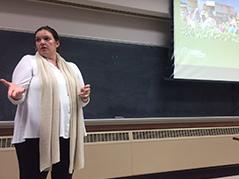 The President and CEO of the Global FoodBanking Network (GFN), Lisa Moon, visited the University of Illinois campus to speak about the role of food rescue in advancing food security as part of the Fall 2017 “Right to Food, Food Assistance, and the Biological Consequences of Malnutrition” lecture series.
The President and CEO of the Global FoodBanking Network (GFN), Lisa Moon, visited the University of Illinois campus to speak about the role of food rescue in advancing food security as part of the Fall 2017 “Right to Food, Food Assistance, and the Biological Consequences of Malnutrition” lecture series.
This lecture series serves to ground a discussion of a right to food and programs to ensure that right is realized in the latest discoveries about the physical effects of food inadequacy. Serving as a graduate seminar for the Division of Nutritional Sciences (DNS 500), the series is co-sponsored by International Food Security at Illinois (IFSI) and is open to the campus community at large.
The Global FoodBanking Network (GFN) is an international hunger relief organization that supports and accelerates the development of food banks in more than 30 countries. Together, the GFN network of food banks rescues more than 960 million pounds of food annually and re-directs it to 6.8 million people in need.
Why we should care about food waste
“As a society, we waste about one third of what we produce,” said Moon before presenting economic and environmental reasons we should all care about food waste.
“Food waste increases food cost because food prices reflect the cost of producing all the food, even what is wasted,” she said.
By contributing to higher food prices, food waste makes food unaffordable to some people.
Environmentally, Moon noted that growing food implies emission of greenhouse gases and use of natural resources. Wasted food represents environmental losses that might easily be avoided.
“If ‘food waste’ were a country it would be the third largest emitter of greenhouse gases. Also the wasted food took resources such as water, soil, land, fertilizer,” Moon said.
Thus, reducing food waste is a way to protect our natural environment.
What can we do?
“The answer to food insecurity is not simply to grow more food because so much of it doesn’t make it to people who need it. We need to focus on logistics,” she said.
Rescuing food that would otherwise be wasted is part of the solution.
Moon acknowledged harvest challenges, post-harvest challenges (storage, access to markets), distribution and retail challenges (estimating demands, inconsistent date codes). She also noted that shifting consumer preferences and new distribution channels all add to the ongoing challenge.
She made several suggestions towards reduced food waste and consequently greater food security:
- Better data. The last open source data study was completed in 2011. “We need to know, for example, where in the supply chain food is being lost and how much is being lost?” she said.
- Investment into cold chain storage to keep food edible longer.
- Incentives towards “Food for food first” meaning that surplus food goes to feed people.
- Date codes that are consistent and reasonable.
- Widespread good Samaritan laws, which currently only six countries have, that take away legal risk for companies who donate food. At a minimum, they should not pay taxes on donated food, ideally, they should get a deduction, she said.
- Focus on quality not cosmetics and increasing opportunities to distribute “ugly food,” such as blemished or bruised fruits which might be re-directed to other food purposes than were originally planned.
Advancement in these areas could reduce post-harvest loss and make it easier for food banks to rescue food.
“Foodbanks operate in more than 70 countries, serve more than 57 million people annually, and rescue 1.8 million tons of food annually. For the next three years Global Foodbanking Network will be thinking about how to promote food rescue in China and India,” she said.
She challenged the audience of scholars and researchers: “You have to think about how you’re going to work with the private sector on this.”
Moon concluded by inviting University students and research groups who are interested in food security to reach out to GFN because they serve as a “matchmaker” to pair up research groups with their network partners.
More about the speaker:
Previously, Lisa served as Vice President of Global Agriculture and Food at The Chicago Council on Global Affairs, where she spearheaded a project that has become one of the leading global contributors to discussions around hunger and food security.
Prior to joining the Council in 2007, Lisa worked with the U.S. Department of Defense and the Center for Strategic and International Studies in Washington, DC. She holds a Master of Arts degree in Security Policy Studies from George Washington University and a Bachelor of Arts degree in international studies, political science, and Spanish from Bradley University. She is on the community board of the Chicago High School for Agricultural Sciences, is a member of the Farm Foundation Round Table, is a Term Member of the Council on Foreign Relations, and is currently a David Rockefeller Fellow of the Trilateral Commission.
Article submitted by Leslie Myrick, 217-244-5373
Sources: No sources found